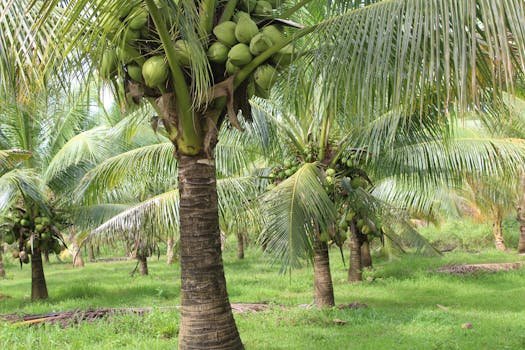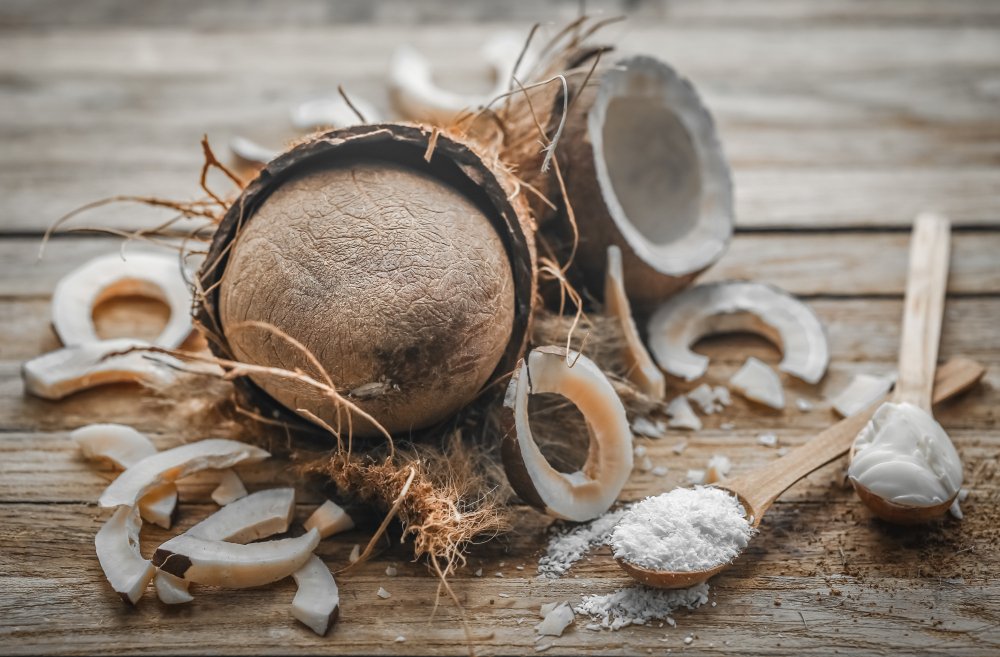The coconut palm, a symbol of tropical paradise, provides sustenance and livelihoods for millions worldwide. However, traditional coconut farming practices often come at an environmental cost, leading to deforestation, soil erosion, and water pollution. The urgent need for sustainable practices is undeniable. This article explores how we can cultivate this valuable resource responsibly, ensuring a bountiful future for both people and the planet. Let’s delve into the world of sustainable coconut farming and discover how we can nurture nature’s bounty while safeguarding our environment.
Nurturing Nature’s Bounty Sustainably
The foundation of sustainable coconut farming lies in understanding and respecting the delicate balance of the ecosystem. This means moving away from monoculture plantations, which deplete soil nutrients and increase vulnerability to pests and diseases. Instead, we should embrace agroforestry techniques, integrating coconut palms with other native trees and crops. This biodiversity not only enriches the soil but also provides habitat for pollinators and beneficial insects, reducing the need for harmful pesticides. Imagine vibrant landscapes where coconut palms stand tall alongside fruit trees, shade-giving legumes, and other native flora, creating a thriving, resilient ecosystem.
Sustainable water management is crucial. Efficient irrigation techniques, such as drip irrigation, minimize water waste and prevent soil salinization. Rainwater harvesting systems can supplement irrigation needs, reducing reliance on external water sources. Furthermore, protecting coastal areas and mangrove forests, vital habitats for coconut palms, is essential for safeguarding water quality and preventing erosion. By adopting these practices, we can ensure that coconut cultivation doesn’t deplete precious water resources.
Soil health is paramount. Sustainable practices focus on improving soil fertility naturally, avoiding the use of synthetic fertilizers which can harm the environment. Composting organic matter, such as coconut husks and leaves, enriches the soil with essential nutrients, promoting healthy growth. Cover cropping can further enhance soil health by preventing erosion, suppressing weeds, and improving water retention. By nurturing the soil, we nurture the coconut palms themselves, ensuring higher yields and greater resilience.
Finally, responsible waste management is key. Coconut by-products, such as husks, shells, and leaves, are often discarded, leading to environmental problems. However, these materials can be valuable resources. They can be used for composting, creating biochar for soil amendment, or even as raw materials for various industries. By finding innovative ways to utilize these by-products, we minimize waste and create a circular economy around coconut farming.
Eco-Friendly Coconut Cultivation: A Guide
Transitioning to eco-friendly coconut cultivation requires a multifaceted approach. First, selecting appropriate coconut varieties is crucial. Choosing disease-resistant and drought-tolerant varieties reduces the need for pesticides and irrigation, minimizing environmental impact. This careful selection ensures that the palms thrive even under challenging conditions. Furthermore, understanding the specific needs of the chosen variety ensures that cultivation practices are tailored for optimal growth and yield.
Organic farming practices are essential. This means eliminating the use of synthetic pesticides and fertilizers, opting instead for natural alternatives. Biopesticides derived from plants and microorganisms effectively control pests and diseases while protecting beneficial insects and pollinators. Organic fertilizers, such as compost and manure, provide essential nutrients to the soil, promoting healthy plant growth without harming the environment. This holistic approach ensures that the end product is not only healthy but also environmentally friendly.
Intercropping, the practice of growing multiple crops together, is a powerful tool for sustainable coconut farming. It enhances biodiversity, improves soil health, and reduces the risk of crop failure. For example, planting legumes among coconut palms can fix nitrogen in the soil, reducing the need for fertilizers. Shade-tolerant crops can also be grown beneath the canopy, maximizing land use and creating a more resilient farming system.
Regular monitoring and assessment are crucial for ensuring the success of sustainable practices. This includes regular soil testing to monitor nutrient levels, pest and disease surveillance to prevent outbreaks, and evaluation of water use efficiency. By continuously monitoring and adapting practices, farmers can optimize their approach and ensure long-term sustainability.
Harvesting Abundance, Protecting the Planet
Sustainable harvesting practices ensure that coconut collection doesn’t damage the trees or surrounding environment. This means using appropriate tools and techniques that minimize harm to the palms and the ecosystem. Training farmers on proper harvesting methods is crucial to prevent damage and ensure the long-term health of the trees. Furthermore, implementing fair labor practices and providing fair wages to workers is essential for creating a just and equitable system.
Post-harvest management is also critical. Efficient processing and transportation of coconuts reduce waste and minimize environmental impact. This includes utilizing renewable energy sources for processing and minimizing the use of packaging materials. Innovative technologies can play a crucial role in optimizing post-harvest management, reducing waste, and improving efficiency. For example, improved drying techniques can enhance the quality and shelf life of coconut products.
Value addition to coconut products can significantly improve the economic viability of sustainable farming. Processing coconuts into value-added products, such as coconut oil, coconut flour, and coconut water, increases profitability and incentivizes sustainable practices. This diversification of income streams makes sustainable farming more attractive to farmers, encouraging the adoption of environmentally friendly methods. Furthermore, promoting fair trade practices ensures that farmers receive a fair price for their products, further incentivizing sustainable practices.
Finally, responsible marketing and consumer awareness are essential. Promoting sustainably produced coconut products through transparent labeling and educational campaigns helps consumers make informed choices. Supporting businesses committed to sustainable coconut farming empowers farmers to adopt eco-friendly practices and ensures the long-term viability of the industry. By working together, producers and consumers can create a market that values sustainability.
A Greener Future: Coconut’s Sustainable Path
The future of coconut farming hinges on a collective commitment to sustainability. Governments can play a vital role by implementing policies that support sustainable practices, providing incentives for farmers to adopt eco-friendly methods, and investing in research and development of sustainable technologies. This includes providing access to training and resources, as well as establishing certification schemes that recognize and reward sustainable farming practices.
Collaboration among stakeholders is crucial. Farmers, researchers, businesses, and consumers must work together to create a sustainable coconut industry. This involves sharing knowledge, developing innovative solutions, and creating a market that values sustainability. By fostering partnerships and promoting knowledge exchange, we can accelerate the transition to sustainable coconut farming.
Education and awareness are key. Educating farmers about sustainable practices, empowering them with the knowledge and skills to adopt eco-friendly methods, is crucial. Raising consumer awareness about the importance of choosing sustainably produced coconut products is equally vital. By promoting responsible consumption, we can drive demand for sustainably grown coconuts, encouraging farmers to adopt eco-friendly practices.
Ultimately, the sustainable path for coconut farming is a journey, not a destination. It requires continuous learning, adaptation, and innovation. By embracing sustainable practices, we can ensure that the coconut palm continues to provide sustenance and livelihoods for generations to come, while safeguarding the environment for future generations. Let’s work together to nurture nature’s bounty responsibly, ensuring a greener future for all.
The transition to sustainable coconut farming is not merely an environmental imperative; it’s an economic and social necessity. By embracing eco-friendly practices, we can ensure the long-term viability of this vital industry, creating a more resilient and equitable future for coconut farmers and the planet. Let’s commit to nurturing nature’s bounty sustainably, ensuring a greener and more prosperous future for all.


